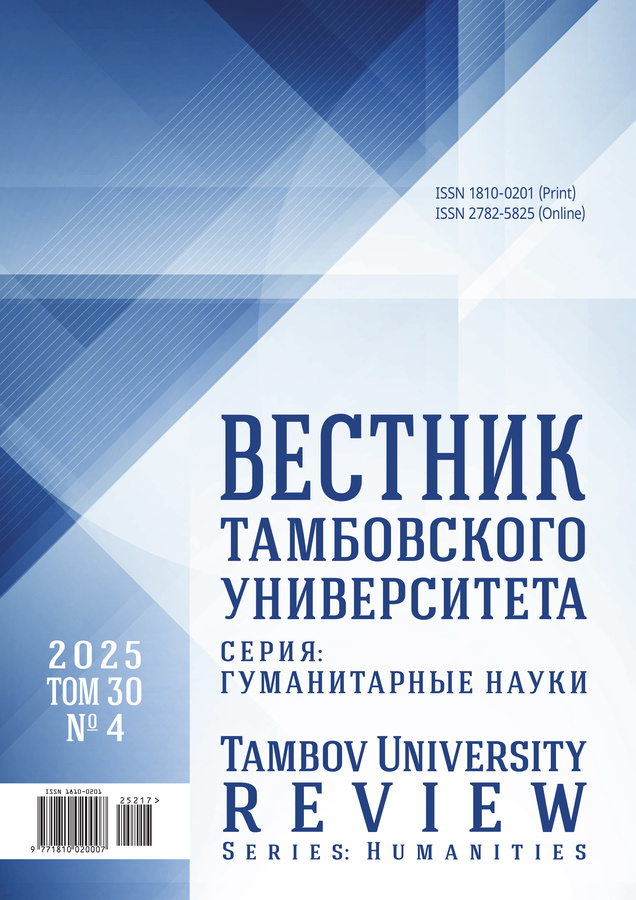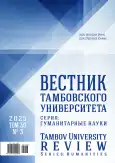В.И. Невский и железные дороги советской России (1917-1922)
- Авторы: Петрыкин Н.Н.1,2
-
Учреждения:
- ФГБОУ ВО «Российский государственный университет правосудия им. В.М. Лебедева»
- Южно-Уральский государственный университет (национальный исследовательский университет)
- Выпуск: Том 30, № 3 (2025)
- Страницы: 728-740
- Раздел: ОТЕЧЕСТВЕННАЯ ИСТОРИЯ
- URL: https://bakhtiniada.ru/1810-0201/article/view/319264
- DOI: https://doi.org/10.20310/1810-0201-2025-30-3-728-740
- ID: 319264
Цитировать
Полный текст
Аннотация
Актуальность. Ход истории во многом определяется ролью личности, ее деятельностью в конкретных обстоятельствах. Чем масштабней личность, тем большее влияние она оказывает на дальнейшие развитие событий в стране и мире. Одним из переломных моментов отечественной истории стали события Октябрьской революции 1917 г. Непосредственным участником, а затем видным общественным и политическим деятелем советского государства был Владимир Иванович Невский. Занимая различные должности, он самым непосредственным образом был связан с железнодорожным транспортом. Исследование роли В.И. Невского в вопросах обеспечения безопасной деятельности железных дорог в период Гражданской войны позволяет по-новому взглянуть на значимые аспекты социально-политической жизни молодого советского государства. Цель исследования – оценить роль В.И. Невского в обеспечении правопорядка на железнодорожном транспорте в первые годы советской власти.
Методы исследования. Хронологический метод позволил уточнить события и явления с точки зрения их последовательности. На основе биографического метода с использованием архивных документов удалось сосредоточиться на изучении деятельности В.И. Невского, определить его роль и влияние на события первых лет становления советской власти в России. Историко-генетическим методом удалось последовательно обнаружить изменения изучаемой реальности в процессе ее исторического движения и в наибольшей мере приблизиться к воссозданию реальной истории обеспечения правопорядка на объектах железнодорожного транспорта. Сравнительно-историческим методом произведено сопоставление действий В.И. Невского с действиями других участников событий, что способствовало более взвешенной оценке его роли в обеспечении правопорядка на объектах транспорта. Структурный метод позволил систематизировать полученную информацию.
Результаты исследования. Рассмотрена роль личности В.И. Невского в обеспечении правопорядка на железнодорожном транспорте в первые годы советской власти. Выявлены закономерности, которые могут быть учтены в современных условиях.
Выводы. Сделан вывод о вкладе В.И. Невского в стабилизацию и развитие железнодорожного транспорта в первые послереволюционные годы, оценен его вклад в организацию и формирование принципов обеспечения правопорядка на железнодорожном транспорте.
Ключевые слова
Об авторах
Н. Н. Петрыкин
ФГБОУ ВО «Российский государственный университет правосудия им. В.М. Лебедева»; Южно-Уральский государственный университет (национальный исследовательский университет)
Автор, ответственный за переписку.
Email: nnpetrykin@yandex.ru
ORCID iD: 0000-0003-1441-6974
кандидат исторических наук, доцент кафедры гуманитарных и социально-экономических дисциплин; доцент кафедры «Современные образовательные технологии»
Россия, 117418, Российская Федерация, г. Москва, ул. Новочеремушкинская, 69; 454080, Российская Федерация, г. Челябинск, пр-кт Ленина, 76Список литературы
- Каллин И.В., Соколова В.И. Как это было: содержание и итоги главных событий 1917 года в истории России // Исторический Поиск. 2022. Т. 3. № 2. С. 5-19. https://doi.org/10.47026/2712-9454-2022-3-2-5-19, https://elibrary.ru/nnenlw
- Буряк Ю.Ю. Реформы Народного комиссариата путей сообщения как пример транзитивности в истории отечественного железнодорожного транспорта (1917–1941 гг.) // Tractus Aevorum: Эволюция социокультурных и политических пространств. 2022. Т. 9. № 2. С. 120-135. https://doi.org/10.18413/2312-3044-2022-9-2-120-135, https://elibrary.ru/ufwbyl
- Посадский А.В. Таганрогский округ: проблемы политики и управления на Юге России в годы Гражданской войны // Вестник Волгоградского государственного университета. Серия 4: История. Регионоведение. Международные oтношения. 2023. Т. 28. № 5. С. 70-79. https://doi.org/10.15688/jvolsu4.2023.5.5, https://elibrary.ru/cpoezj
- Петрыкин Н.Н. Формирование государственных органов обеспечения безопасности железных дорог в России (октябрь 1917 – июль 1918 г.) // Вестник Тамбовского университета. Серия: Гуманитарные науки. 2024. Т. 29. № 1. С. 177-191. https://doi.org/10.20310/1810-0201-2024-29-1-177-191, https://elibrary.ru/egcflk
- Колпаков П.А. Полицейский надзор за законностью железнодорожных грузоперевозок в Российской империи в годы Первой мировой войны // Научный диалог. 2024. Т. 13. № 7. С. 410-426. https://doi.org/10.24224/2227-1295-2024-13-7-410-426, https://elibrary.ru/soqfgx
- Сенин А.С. Московский железнодорожный узел. 1917–1922. Москва, 2004. 573 с. https://elibrary.ru/qqjpbr
- Зверков Е.А. Уголовно-розыскная работа органов внутренних дел в 1917–1927 гг. (по материалам Центрального Черноземья) // Вестник Волгоградского государственного университета. Серия 4. История. Регионоведение. Международные отношения. 2025. Т. 30. № 1. С. 163-175. https://doi.org/10.15688/jvolsu4.2025.1.14, https://elibrary.ru/uuuvjf
- Руднева С.Е. О положении железнодорожного транспорта России осенью 1917 года // Культура и цивилизация. 2022. Т. 12. № 1-1. С. 269-274. https://doi.org/10.34670/AR.2022.98.38.032, https://elibrary.ru/yqwyqg
- Давыдов А.Ю. Политические отделы на советских железных дорогах в годы военного коммунизма // Вестник Санкт-Петербургского университета. История. 2024. Т. 69. № 2. С. 335-357. https://doi.org/10.21638/spbu02.2024.206, https://elibrary.ru/fsvwrz
- Старостенков Н.В. К 105-летию воссоздания железнодорожных войск в составе Красной Армии (1918–1921 гг.) // Сборник материалов Всероссийской научной конференции, посвященной 105-летию Рабоче-крестьянской Красной армии и Рабоче-крестьянского Красного флота. Москва, 2023. С. 49-54. https://elibrary.ru/vmjaaf
- Бочарников И.В. Гражданская война в России: основные причины, следствии и итоги // Человеческий капитал. 2022. № 2 (158). С. 11-32. https://doi.org/10.25629/HC.2022.02.01, https://elibrary.ru/zsujuu
- Архипова Т.Г. Особенности организации и деятельности государственного аппарата РСФСР в годы Гражданской войны и иностранной военной интервенции: взгляд через сто лет // Кафедре истории государственных учреждений и общественных организаций – 70 лет: доклады Междунар. науч. конф., посвящ. 100-летию со дня рожд. проф. Н.П. Ерошкина. Москва, 2023. С. 30-35. https://elibrary.ru/glyqjy
- Белоусова Г.А. Владимир Иванович Невский: яркая и незаурядная личность // Актуальные проблемы гуманитарных и естественных наук. 2018. № 2-2. С. 35-38. https://elibrary.ru/cbffkb
- Белоусова Г.А. В.И. Невский: государственный деятель, историк, человек. Москва, 2008. 187 с. https://elibrary.ru/qpjxpb
- Анфертьев И.А. Докладная записка представителя «Рабочей оппозиции» Гавриила Мясникова в ЦК РКП(б): источниковедческий потенциал документа // Новейшая история России. 2023. Т. 13. № 3. С. 648-663. https://doi.org/10.21638/spbu24.2023.308, https://elibrary.ru/lcqllu
Дополнительные файлы










